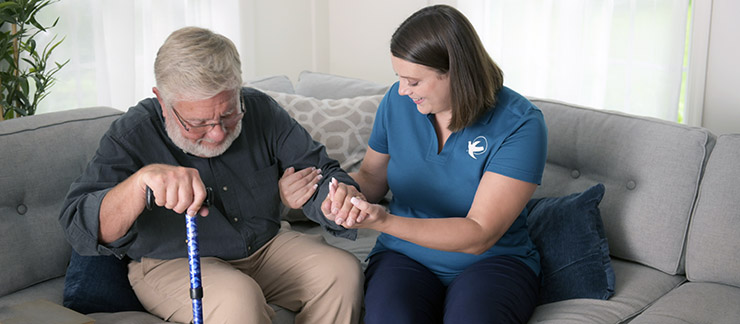
5 Ways to Reduce Fall Risks for Seniors With Parkinson’s Disease
Preventing a fall is always a big concern as we care for aging seniors. It's even more worrisome if a loved one has a movement disorder such as Parkinson's disease. Every year, more than half of people who live with Parkinson’s disease have a fall, and their risk of hip fracture is four times higher than most other seniors.
This heightened risk means that caregivers and family members must be extra vigilant. Creating a safe living environment is crucial. Staying informed and attentive to a senior loved one’s needs is key to helping them live more safely and confidently.
Fall Prevention Tips For Seniors With Parkinson’s
While we can't halt the progression of Parkinson’s disease, there are several things you can do to help your elderly loved one age in place safely and maintain their quality of life at home.
- Understand How the Disease Progresses
Parkinson’s disease is a degenerative condition that worsens over time. As it advances, it disrupts the brain’s ability to control and coordinate muscle movements. Simple movements we take for granted—like subtly turning to navigate a room—can become disjointed and unpredictable for individuals living with Parkinson’s disease.
As physical limitations worsen, your loved one will need more help with dressing, bathing, and other activities of daily living. Over time, they will require care for basic functions such as eating and drinking.
Related reading: Can I Take Care of My Loved One With Parkinson’s Disease at Home?
- Stick to Their Medication Schedule
Most medications for Parkinson’s disease and other movement disorders must be taken on a strict schedule. Symptoms can come back quickly if a dose is missed or the medication wears off.
Missing doses can also cause side effects that may increase the risk of falls, such as dizziness, drowsiness, or low blood pressure. Visiting Angels professional caregivers can remind your loved one to take their medication on time—staying on their medication schedule will provide the best symptom control.
- Reduce Fall Risks at Home
Because Parkinson’s disease interferes with balance and gait, it will be important to remove obstructions and distractions to reduce the risk of falls. This can include:
- Eliminating tripping hazards, such as rugs and cords
- Moving furniture to allow enough width for assistive devices such as walkers
- Installing safety features such as grab bars in bathrooms
- Keeping frequently used items within easy reach
- Using nightlights in the bedroom, bathrooms, and hallways
An unexpected symptom of Parkinson’s disease is sometimes attempting to act out vivid dreams. To keep your loved one safer, ensure the bedroom area is free of clutter and secure open stairways.
Related reading: Safe and Steady® Fall Prevention Program
- Choose Proper Footwear
While socks and slippers are easy to put on and take off, they don’t provide the traction that someone living with Parkinson’s disease needs. A comfortable, well-fitted shoe with high-traction, non-skid soles can keep your senior moving safely and reduce the risk of other foot-related health problems such as blisters, bunions, and callouses.
- Encourage Safe Movement
Research shows that as little as 2.5 hours of exercise a week can slow the decline in quality of life for people with Parkinson's disease. A professional caregiver can help your loved one stay active by accompanying them to physical therapy or monitoring exercises their doctor or physical therapist has approved.
Unpredictable movements may cause your loved one to stay home for fear of falling or withdraw from activities to avoid unwanted attention. A fall prevention plan or companion care can help alleviate some of their anxieties so they can enjoy more social time.
Professional In-Home Support for Parkinson’s Care
Caring for a loved one with a degenerative condition such as Parkinson’s disease can be physically and emotionally demanding. You will eventually need help, and you’ll need time to take care of yourself as well.
Visiting Angels professional caregivers can help at any stage of the disease, from dressing and bathing to light housekeeping and transportation to appointments. You can also turn to us for respite care to give yourself a breather or to handle your other responsibilities.
Contact your local Visiting Angels office to create a personalized in-home care plan for your loved one.


